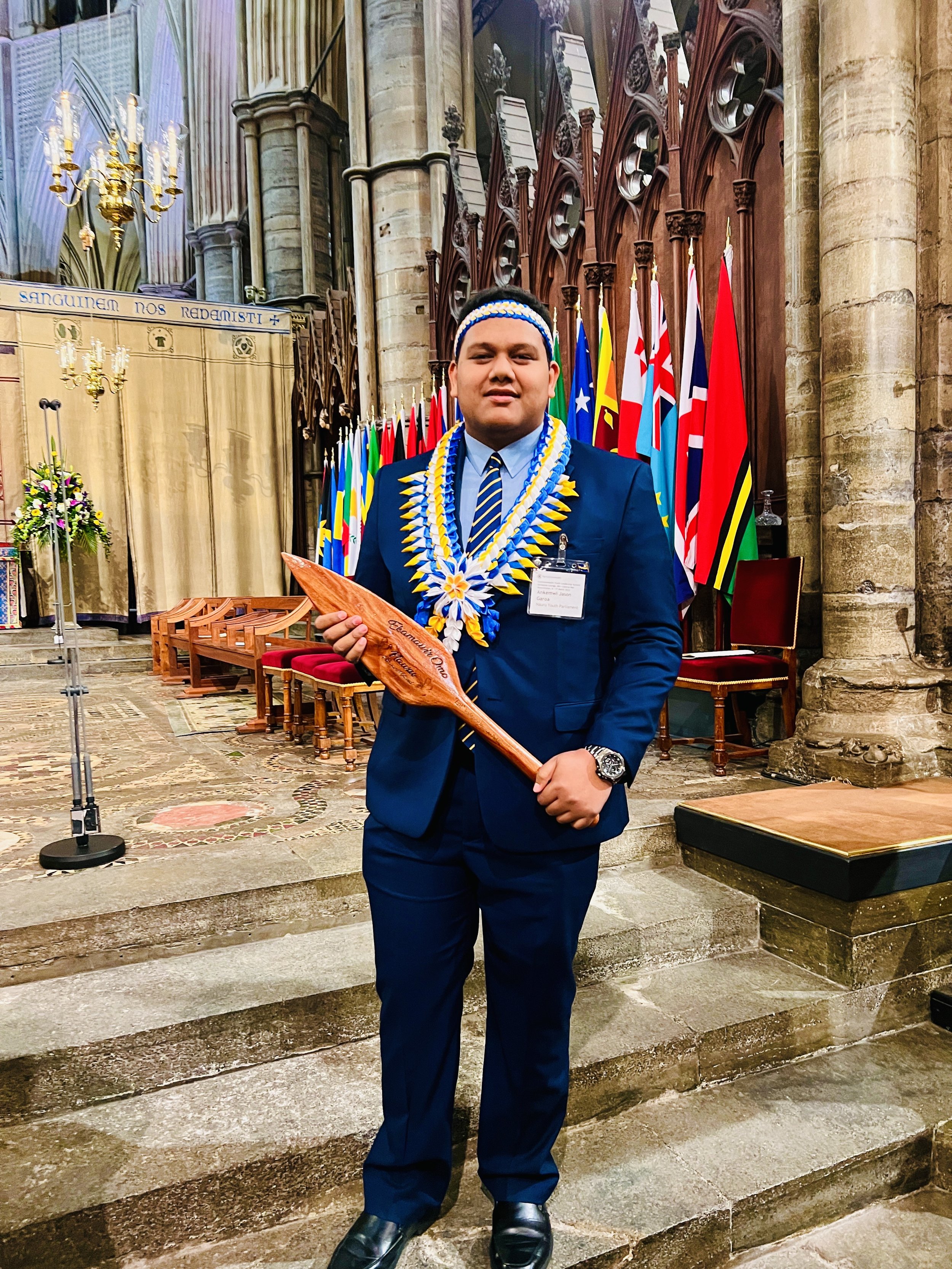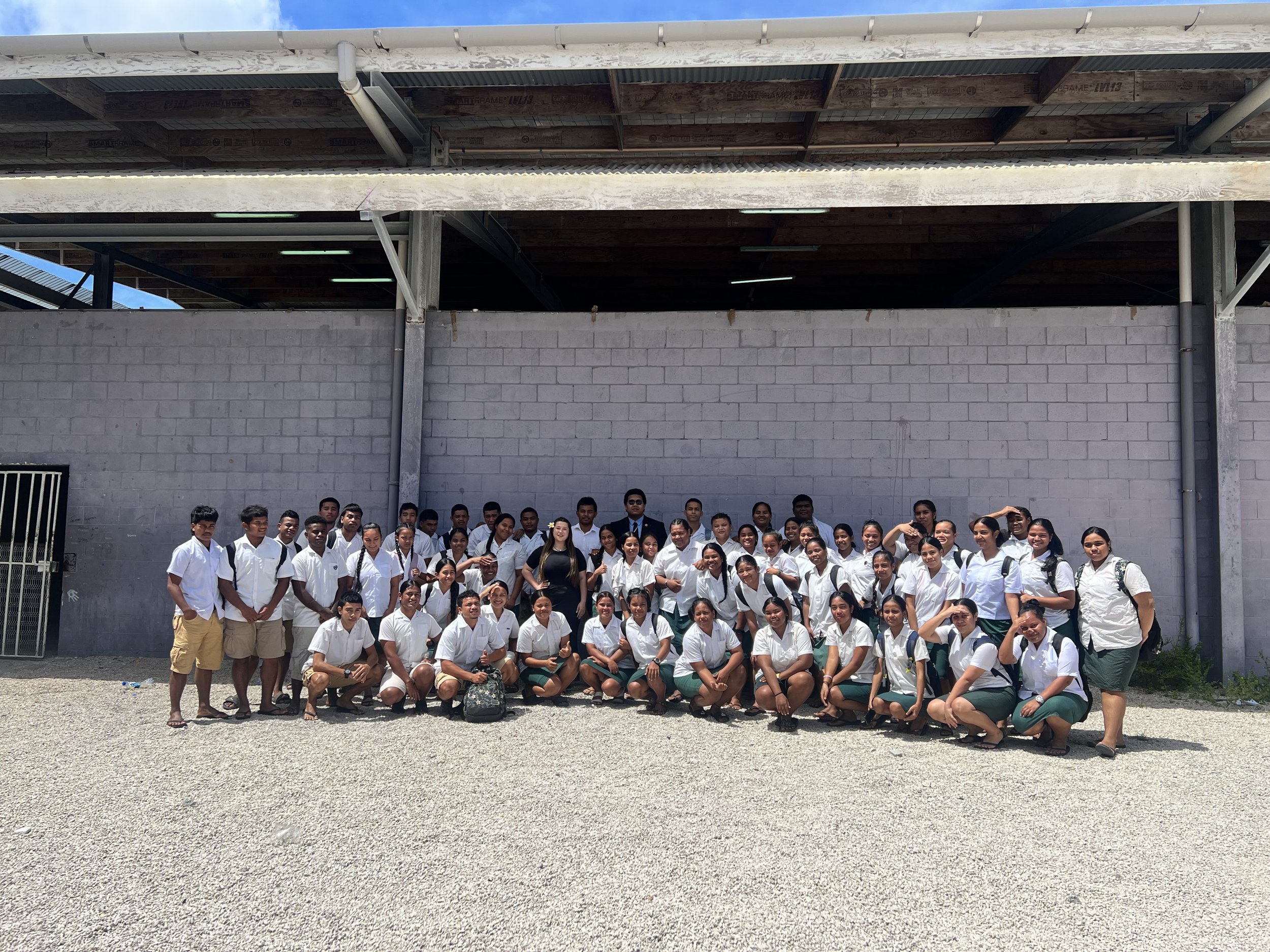My Nauru Story: Lessons of the Past - Looking to the Future
Ekamowir omo, greetings from the pleasant island of Nauru.
Situated northeast of Australia, my island home features coral reefs and white sandy beaches. Located at the centre of the Pacific Ocean, with an area of 21sq kilometres and a population just over 11,600, Nauru is the world’s smallest island nation and independent republic.
From a young age I was taught by my elders the importance of history, tradition and faith. Their lessons became my guide as I navigated my way around this vast and unpredictable ocean called life. When at times I was faced with adversity, or had difficult decisions to make, I always based my actions on the principles that were taught to me.
Commonwealth Youth Summit - Commonwealth Day Special Service at Westminster Abbey, wearing national costume.
Learning about our people’s history has always been my passion. Just reading or hearing the stories of our people was always an enriching opportunity that helped me to understand what it truly meant to be Nauruan.
Growing up, I saw how disconnected most of my generation was from their Nauruan identity and our island’s history. Many young people today do not even adhere to the moral codes or traditions, our elders intended to pass on to us.
I have seen young Nauruans who displayed so much talent and potential throw away their lives for distractions and things that did not really matter. I have seen young Nauruans that did not have any understanding about their own people’s history, or the struggles that our ancestors had to endure to ensure our people’s survival and achieve the right to self-govern.
I recall one time when I was a student at Nauru Secondary School when we were celebrating Constitution Day. I asked some students what they knew about the occasion and what it meant to them. Most said it was only about winning in the sports competitions which were always held on that day.
There was no mention of honouring our country’s founding document or our founding fathers. When I saw that our young people were more willing to embrace the games that are meant to commemorate the occasion, rather than the actual occasion itself, I knew that this was a problem.
Grappled with this issue, I felt that I needed to take a stand and rather than sit idly by, I needed to do something about it. And so when I was still a junior in secondary school, I decided to take action and worked with the Student Representative Council.
Elected as Nauru Secondary School’s Head Prefect and President of the Student Representative Council. Picture taken with mother, younger sister, two cousins and aunty.
Firstly, I organised school cultural events to celebrate national days. These included Nauruan song competitions, organising culture booths and pageants. I am proud to say, that the school pageant competition which focuses primarily on traditional attire, is now a yearly event and it is something I believe that embraces Nauruan culture, through a more modern and tangible fashion.
I became the Secretary for the school’s cultural group who performed Iruwo, a traditional art similar to New Zealand’s Haka. I helped to coordinate the group when they performed for official government functions and did public relations work through school and social media, educating both youth and the wider public.
From there, I also led the school choir which performed on many important occasions, including when the Pacific Islands Forum was held in Nauru in 2018.
The choir was something I especially cherished very deeply. The songs we sang weren’t just any old song with empty lyrics. They told us the history of our people and the pain we suffered through global conflicts that were not our own.
I remember vividly, the emotions expressed from our elders who attended our live performances. Some shed tears, as the songs were stories that reminded them of their lost loved ones. Others smiled as they were proud to see their grandchildren sing in their own mother tongue.
All of these activities were truly splendid experiences, which gave all of our members a newfound appreciation for our country, its history, beliefs and tradition. To this day, I still have some members every now and then, ask me for the lyrics to the songs just so they could sing them again.
Nauru still faces a number of issues on this front. I feel we are not doing nearly enough to preserve our unique identity. We still have yet to produce a Nauruan dictionary, our cultural arts, songs and Nauruan language are not taught in schools and society today continues to compromise on its moral values.
I graduated from school as the President of the Student Representative Council. And upon graduating I learned something important. Intergenerational issues such as cultural decline need to have intergenerational solutions. We need the involvement of not just students and young people, but teachers, parents and the wider community as well, in order to create meaningful change.
As a member of the Nauru Youth Parliament, Ambassador in One Young World and Regional Coordinator for the sub-region of Micronesia in the Pacific-Australia Youth Association, I aim to change my country for the better through these networks that I have established links with.
Nauru Youth Parliament group photo in Parliament Chambers. First-ever youth parliament to have a sitting in the chamber.
From advocating for cultural based policy in the Nauru Youth Parliament, to exploring engagement opportunities in One Young World, I look forward to the new possibilities of developing strategies and solutions to address these issues for Nauru in the near future.
My exposure to other bold and charismatic young people from all over the world has left me with a desire to do more for my country. I want to share with other Nauruans that same inspiration. I want to share with them my dream of rebuilding a Nauruan society that is historically informed, culturally empowered and morally strong.
Our historic past, cultural identities and moral values are carried through the traditional arts and the stories we hear from our elders. All of these are what defines our national identity and are integral to building and maintaining national pride, stability and sovereignty over our island nation.
With God as our strength, I have faith that together we can ensure that our people’s national identity does not just merely survive, but that it will thrive for many generations to come.
Written by Ankemwi Jason Garoa - PAYA Regional Coordinator for Micronesia
PAYA Ambassador Tayla Bond and I make visit to Nauru Secondary School to encourage young people to take up opportunities and pursue their passions.




